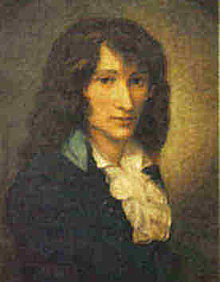- Johann Gottfried Müthel
-
Johann Gottfried Müthel (January 17, 1728 – July 14, 1788) was a German composer and noted keyboard virtuoso. Along with C.P.E. Bach, he represented the Sturm und Drang style of composition.
As far as is known, he was the first to use the term fortepiano in a published work, in the title of his Duetto für 2 Clavier, 2 Flügel, oder 2 Fortepiano (1771), which reflects the rising popularity of the fortepiano at that time.
Contents
Biography
He was born in Mölln in the Duchy of Lauenburg, the fifth of nine children. His father was Christian Caspar, an organist and friend of Georg Philipp Telemann. He studied music with his father, and later Johann Paul Kunzen in Lübeck. In 1747, at age 19, he became a court organist and cembalist for Duke Christian Ludwig II of Mecklenburg-Schwerin, in Schwerin.
In 1750 he was given leave to study with Johann Sebastian Bach in Leipzig. He became Bach's last pupil, beginning study only three months before the master's death. In that time, he notated a number of the blind composer's final works, including the Chromatic Fantasia and parts of the Orgelbuchlein. According to Bach's biographer Philipp Spitta, he was present at Bach's deathbed, and took over his duties for nine weeks. Afterwards, he continued study with Johann Christoph Altnickol, who had also been living and studying with Bach. Afterwards he took the opportunity to travel and meet other composers, the most notable of whom was C.P.E. Bach (then residing at the court of Frederick II of Prussia at Potsdam), with whom he maintained a lifelong friendship and correspondence. In 1751 he returned to the ducal court, where he remained for two more years, eventually being replaced by his younger brother.
In 1753 he moved to Riga (now in Latvia, then part of the Russian Empire), where one of his brothers had moved. It was here that he published his first works, in 1756; he only published a few works in his lifetime. At first he worked as a conductor for a private orchestra; later, he was appointed organist at St. Peter's Church, which he served from 1767 until 1788, when he died in nearby Bienenhof.
Influence
Riga was far from the established musical centers of Europe, and published few works, but he gained praise from a number of musicians for his virtuosity. The English music historian Charles Burney, who mentioned him several times in his writings, held him in high esteem. The German Christian Friedrich Daniel Schubart wrote of his harpsichord skill that "connoisseurs that have heard him cannot praise enough the quickness, correctness and lightness with which he conquers mountains of difficulties."[1]
He is believed to have been a skilled improviser on the keyboard. He seems to have preferred the clavichord.[1]
Compositions
Most of his works remained unpublished in his lifetime, and some known works are still without official publication. None of the works for his principal instrument, the organ, were published in his lifetime, nor were any for non-keyboard instruments.
For keyboard
His known works include a total of seven concerti, nine sonatas, and numerous other shorter pieces.
- Concerto in B flat major (printed 1767)
- Concerto for Harpsichord in D minor (printed 1767)
- Sonata No. 1 in F major (printed in 1756)
- Sonata No. 2 in G major (printed in 1756)
- Sonata No. 3 in C major (printed in 1756)
- Duetto für 2 Clavier, 2 Flügel, oder 2 Fortepiano (printed in 1771)
- Duetto in E-flat major (printed in 1771)
- Arioso with 12 Variations, No. 1 in G major (printed in 1756)
- Arioso with 12 Variations, No. 2 in C minor (printed in 1756)
- 12 Variations for Clavichord
- Minuet with 6 variations
- Tempo di Minuetto con Variazioni
- Fantasy in F for Organ
For voice
- 45 Choice Odes and Songs from Various Poets (45 Auserlesene Oden und Lieder van verschiedenen Dichtern) (printed in 1759)
- A cantata
For other instruments
- Concerto for Bassoon in C major
- Concerto for 2 Bassoons in E-flat major
- Sonata in D major for Flute and Basso Continuo
Trivia
Müthel is greatly talked about in the short story "Early Music" by Jeffrey Eugenides.
References
- ^ a b http://www.harpsichord-sd.com/clavichord/muethel.html. Liner notes by Peter Reidemeister. Accessed on May 12, 2006
External links
Categories:- German composers
- Baroque composers
- Classical era composers
- 1728 births
- 1788 deaths
Wikimedia Foundation. 2010.

